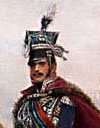 |
| Bonaparte the Ogre ... |
Napoleon hesitated to order full mobilization, for he was well aware that the vast majority of the people were wholly opposed to a renewal of hostilities.
As a gesture to public opinion - and to win time - the Emperor at once put out peace feelers toward the Allied governments, hoping that their growing disillusionment with the House of Bourbon and the festering political divisions within their ranks would play into his hands and persuade at least a few to accept a fait accompli and acknowlege Napoleon as the ruler of France.
Any such hopes were soon dashed ino oblivion. Seven days before the Emperor reached Paris, the representatives of the Powers met at Vienna to outlaw the Emperor and to pledge over half a million men for the destruction of "the Ogre" once and for all. On March 25 a formal treaty of alliance was signed between England, Austria, Prussia and Russia, and the Seventh Coalition came into being, backed by a promise of £ five million in English gold. Prussia and England at once put a joint force of 150,000 men into the field, and the other governments began their preparations. All negotiations with Napoleon were broken off.
~ D. Chandler, The Campaings of Napoleon, p. 1014




































































